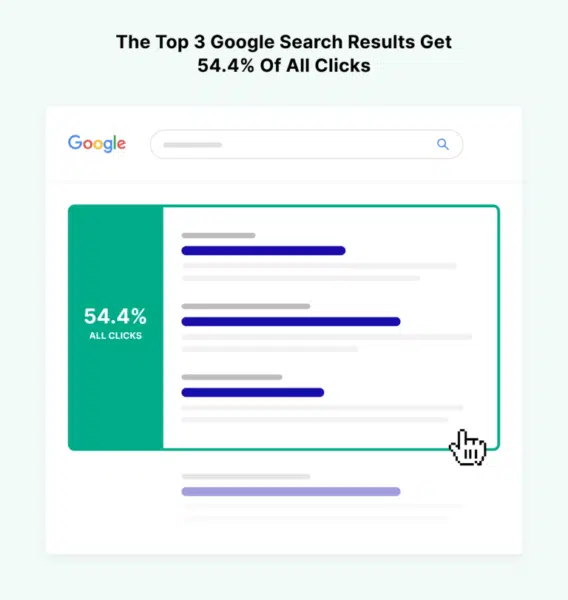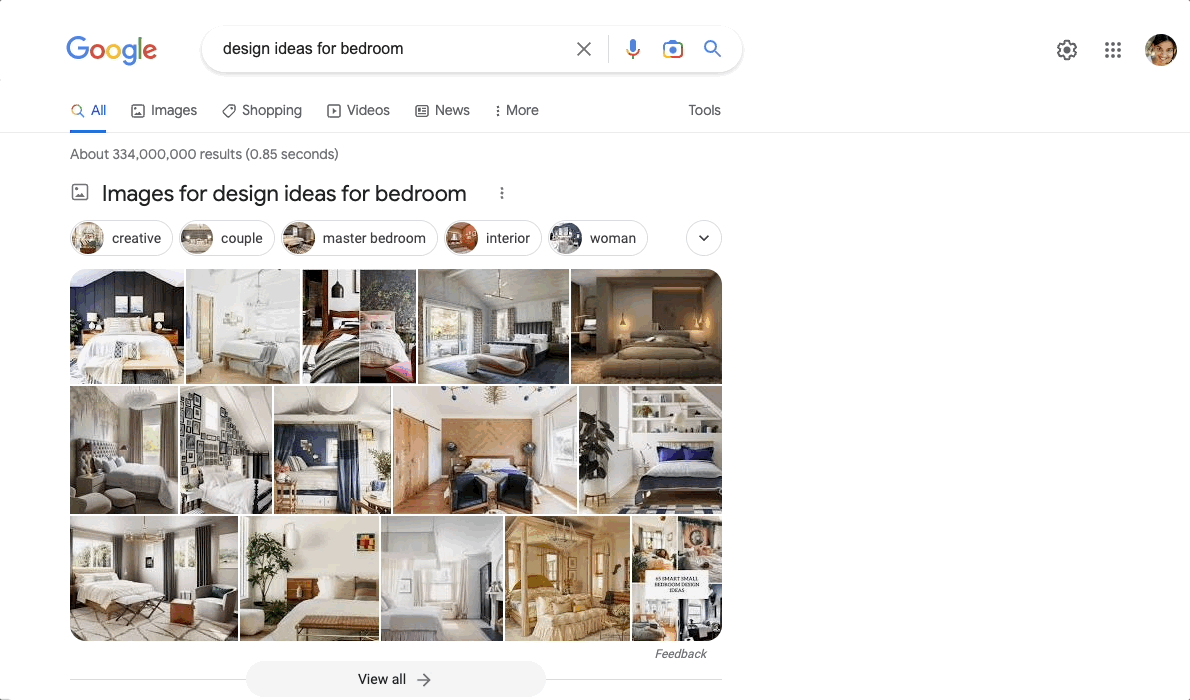In December, Google introduced continuous scroll to desktop search results. SEO practitioners immediately anticipated what the move’s impact will be on the industry.
In this article, I’ll share insights on continuous scroll’s relevance today, its potential impact to the search experience, and how SEOs can adapt.
The way I see it, continuous scroll signals a move away from the outdated “page” metaphor.
Since the early 1990s, we have used the term “webpages,” as if websites were printed on paper. Despite over 20 years of technological progress, the flawed metaphor still persists, even on Google’s SERPs. But it might be going away soon.
The concept of scrolling is pervasive on the web today. Most webpages are extended “below the fold,” and content is mostly reachable through scrolling, the easiest way to navigate websites.
That’s why in recent years, the scroll user experience is being enhanced with continuity. This way, web content is loaded on-demand as the user scrolls down – thus, the name “infinite scroll.”
Technically, it’s not really infinite since the scroll only lasts for as long as there is content to show. Rather, the correct term is “continuous scroll.”
Most social media platforms implement this approach to show users an unlimited – and often addictive – stream of content. Freedom, an app that blocks infinite scroll sites, is gaining popularity among people looking to eliminate distractions and ensure productivity while at work.
Some publishers even started to merge pagination and scrolling approaches – where users are served with a new article once they reach the end of the post they’re reading.
SEO still heavily relies on the page metaphor to assign particular keywords to certain pieces of content.
In contrast, smaller search engines, such as DuckDuckGo, have been serving search results without pagination for quite some time.
However, the user still needs to click the “More results” button, which uncovers another batch of organic SERPs, and the search engine still shows numbers on the results pages.
People are much more likely to scroll than to click. It’s simple psychology.
Why stop and carry out a different action, when it’s so much easier to move in a direction you have already started to move toward?
‘The best place to hide a dead body…’
It’s no secret that most searchers only click search results on Google’s Page 1.
Within the SEO industry, there is even an old joke alluding to the comparably minuscule likelihood of getting found on Page 2.
“The best place to hide a dead body is Page 2 of Google’s search results.”
Oh no! Just think of all the dead bodies hidden on page two throughout the years! Soon, they will all be found.
Apart from the running joke of SEO insiders, the impact of giving up the “page” metaphor on Google search may be significant or negligible. Let’s assess it based on existing data and experience.
Over the years, we have seen studies analyzing click distribution on search results and user experience tests on how “the fold” (or scrolling) affects the visibility of page elements and usability in general.

The number one organic result gets the majority of attention and clicks, between 20 to 40%. The second and third results still get double-digit percentages. All in all, it’s more than half of the total clicks.
The rest of the page? Not so much!
Most click distribution studies found that the rest of the results only get 2%–9% of clicks.
Get the daily newsletter search marketers rely on.
Above the fold: Truth or myth?
The concept of “above the fold” traces its roots to traditional newspapers. Due to their large size, newspapers were often folded in half to be displayed on newsstands or carried around.
The most important news stories were placed on the first page and “above the fold,” visible to passersby casually scanning the headlines.
When the page and front page metaphors were transferred to the web, many website owners started applying the same rule to online content as well.
Does “above the fold” only apply to actual newspapers? Information architecture, user experience and graphic design experts have conflicting opinions on the matter.
Some experts believe it’s vital to put the most important elements on top of the page where it’s visible without scrolling, similar to the “above the fold” concept from traditional newspapers.
Others think that the fold is a myth on the web as most people tend to scroll down to view the rest of a webpage anyway.
Whether they agree with the concept or not, most experts concur that putting as much as possible on the homepage or landing page is important.
This is because, on average, ~80% of website visitors will only see one page during their visit and go back without clicking anything.
Thus, a combined solution seems to be the best compromise – displaying important elements (i.e., value proposition, CTA, contact) above the fold and having the rest visible on scroll without relying on clicks to other pages.
Some designers even create fancy effects to further enhance the experience of scrolling through a page or content, dropping the page metaphor altogether to create “one-page websites.”
Apparently, this is also the approach Google is taking for its search results.
Given the increasing clutter their search results have amassed over the years, including a plethora of SERP features and an ever-growing number of ads, Google needed more space to potentially push actual organic results further down the SERP.

There are many potential ways continuous scroll can impact the search experience on Google and thus also SEO practices.
Here are some ideas from me and other SEO experts debating the change.
No more ‘Page 1’ results
Let’s start with the obvious outcome. There will no longer be a real “Page 1.”
SXO strategist Lucas Rogala puts it in a very funny way:
- “Now everybody can rank on [the] first page.”
Andrew Prince, senior SEO analyst at Wayfair, says it more eloquently:
- “This may end the ‘we want to rank on Page 1’ requests now since ~6 pages of results will appear while scrolling down.”
More results will be viewed
It’s much more likely that people will scroll further down than the usual top 10 organic results due to the newfound convenience.
Areej AbuAli, technical SEO and founder of Crawlina, supports this conclusion:
- “Humans are scrollers by nature. This is good news and it’ll likely reflect in better click-through rates for lower ranking domains.”
The top 3 may lose some attention
Currently, the top 3 results are where the bulk of organic clicks go. This likely won’t change in the near future, but their dominance might dwindle.
Over the years, we’ve seen this happen due to the proliferation of:
- Additional features.
- Various page elements.
- More content types.
This expansion has already diluted the inverted pyramid of click distribution. Back when Google search results still displayed the proverbial “10 blue links,” click heat maps indicated an overwhelming bias toward the number one spot, with more than 40% of clicks going there.
Nowadays, the top organic spot earns around 28% of clicks, as Backlinko and Sistrix click-through rate studies have shown.
Given the additional options further down, people might get used to scrolling more and rely less on the top results.
More ads and features on top
With Google having more potential space to fill ads and special features, there is also a better excuse to push organic results further down.
We can also probably expect more special features on top because they can’t be shown properly below continuous scroll results.
Websites with footers, despite having an infinite scroll functionality, are often a usability nightmare. Users have to chase the disappearing footer to reach a footer link and click it.
Therefore, we potentially won’t see as many ads and features below organic results. Where else can Google put them? In the “middle” before the next section formerly displayed as a separate page?
SEO manager Tobiasz Szlęk expects to see a lower CTR because of this:
- “… we should be expecting to see more zero-click searches as Google will be presenting more and more information directly on the result pages …”
Fewer or more result clusters from one website
In the past, you could get two results on Pages 1 or 2, or even two separate results on different pages.
When you change the display settings from 10 results per page to 100, you might also see two results for one website combined despite them usually being shown more than a few positions apart (i.e., an article ranking 9th would be grouped with another one from 55th).
It will be interesting to see how Google will deal with that from now on. Such combined result clusters may become more frequent at first but less likely to show once Google adjusts the relevance to the new reality of continuous scrolling.
Why? Let’s be honest, just because a second result is on the same site does not always mean it is as helpful as the other higher-ranking one.
How can SEO specialists still optimize or adapt?
So how do we adapt as publishers, content creators and SEO practitioners? It depends, of course, on what the actual impact will be.
Given past developments, consider these changes to your SEO approach and long-term content marketing plans.
Focus on low-hanging fruits which can potentially rank in the top 3
It’s still advisable to rank in the top 3, not “Page 1” or “Top 10.” As, without pages, the latter is completely useless.
So it’s often better to find the low-hanging fruits already ranking and optimize those pages for the keyphrases where they can reach the top 3.
Stand out in the SERPs with page titles
Given the larger number of organic results people will peruse from now on, it’s more important than ever to stand out in the crowded SERPs.
Some techniques to consider include:
- Featured snippets.
- Special characters.
- Emojis.
Ideally, you must always optimize your page titles and meta descriptions so that searchers do not just choose the listicle with the largest number in front or the article with the latest date before the description.
Make use of Google features like images and ‘People Also Ask’
If you can’t beat them, join them. It’s hard to compete against Google for “SERP real estate” when they own that space.
You’ll have to play by Google’s rules, and if they say you have to hide below the fold and stay there, then you have no choice.
That said, you can get preferential treatment by optimizing your content for Google’s special features.
One successful technique is to go after a more specific search query, often displayed as “People Also Ask” (PAA) questions.
When you check some of them, you have to wonder whether searchers really do make such grammar mistakes or if the algorithm displays potential questions in the most convenient and context-sensitive way.
Regardless of why this happens, you can always find many questions to answer just by checking the results for the keywords you are optimizing for.
Other ways of fast-tracking your way to the top and being more clickable than your competition are image and video content. Look at repurposing your written content as images or videos using various formats.
Creating dedicated images (photos, visualization, infographics) or videos (interviews, tutorials, reviews) can boost your chances of getting clicked.
Opinions expressed in this article are those of the guest author and not necessarily Search Engine Land. Staff authors are listed here.
New on Search Engine Land
